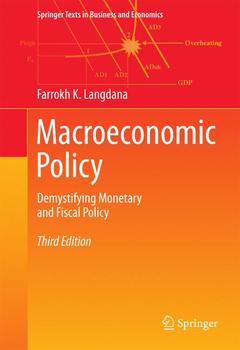Macroeconomic Policy (3rd Ed., Softcover reprint of the original 3rd ed. 2016) Demystifying Monetary and Fiscal Policy Springer Texts in Business and Economics Series
Auteur : Langdana Farrokh K.

Dr. Langdana's areas of specialization include monetary and fiscal theory and international trade and global macroeconomic policy. His research deals with macroeconomic experimentation and the role of stabilization policy in an expectations-driven economy. He has published several articles as well as five books in this area. His new book, co-authored with Peter Murphy and published by Springer Press, is titled "International Trade and Global Macropolicy."
Dr. Langdana is the recipient of the Horace dePodwin Research Award and more than 30 teaching awards, including the highest possible teaching award at Rutgers University -- the Warren I. Susman Award. He also has received Rutgers Business School's Paul Nadler Award for Excellence in Teaching. From 2011 to 2013, the Award for Excellence in teaching in the MBA Program was named the Farrokh Langdana Teaching Excellence Award.A professor in the Finance and Economics Department at Rutgers Business School, Dr. Langdana is also director of the globally ranked and highly regarded Rutgers Executive MBA Program. Dr. Langdana was recently interviewed by The Wall Street Journal where he discusses how the Rutgers EMBA program evolves constantly to meet the changing needs and demands of the global executive workplace. He has been director since 1997.
Revised and updated to include the monetary phenomena of the Great Recession and the resulting global financial trends
Includes new case studies on quantitative easing in the Eurozone and the ties between tapering in the US and capital outflows to India, Brazil, and South Africa
Expands coverage to include a greater focus on India and the “unloved” Asian countries: Thailand, Malaysia, Singapore, Indonesia, and the Philippines?
Includes supplementary material: sn.pub/extras
Date de parution : 04-2018
Ouvrage de 318 p.
15.5x23.5 cm
Thèmes de Macroeconomic Policy :
Mots-clés :
Great Recession; Keynesian; fiscal policy; macroeconomic policy; monetary policy; supply-side



